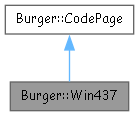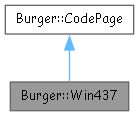Conversion routines to support the Win437 text encoding scheme. More...


Static Public Member Functions | |
| static uint32_t | translate_from_UTF8 (const char *pInput) noexcept |
| Convert a single UTF8 stream character into a Win437 8 bit char. | |
| static uintptr_t | translate_from_UTF8 (char *pOutput, uintptr_t uOutputSize, const char *pInput) noexcept |
| Convert a UTF8 stream into a Win437 "C" string. | |
| static uintptr_t | translate_from_UTF8 (char *pOutput, uintptr_t uOutputSize, const char *pInput, uintptr_t uInputSize) noexcept |
| Convert a UTF8 stream into a Win437 byte array. | |
Static Public Attributes | |
| static const uint8_t | g_UpperCaseTable [256] |
| Table to convert all characters to upper case. | |
| static const uint8_t | g_LowerCaseTable [256] |
| Table to convert all characters to lower case. | |
| static const uint8_t | g_ToUTF8Table [128][4] |
| Table to convert Win437 to UTF8. | |
| static const uint16_t | g_ToUTF16Table [128] |
| Table to convert Win437 to UTF16. | |
 Static Public Attributes inherited from Burger::CodePage Static Public Attributes inherited from Burger::CodePage | |
| static const uint32_t | kInvalid = UINT32_MAX |
| Value returned if a routine failed. | |
Conversion routines to support the Win437 text encoding scheme.
Win437 is a high ASCII encoding that's used by the MSDOS file system for MSDOS and Windows 95, etc. This class will allow the conversion of other character mappings to Win437 for use in calling Win32 API functions.
The character map for Win437 looks like this. Click here.
|
staticnoexcept |
Convert a UTF8 stream into a Win437 "C" string.
Take a "C" string that is using UTF8 encoding and convert it into a Win437 encoded "C" string. The function will return the size of the string after encoding. This size is valid, even if it exceeded the output buffer size. The output pointer and size can be nullptr to have this routine calculate the size of the possible output so the application can allocate a buffer large enough to hold it.
| pOutput | Pointer to byte buffer to receive the Win437 encoded string. nullptr is okay if uOutputSize is zero, otherwise it will page fault. |
| uOutputSize | Size of the output buffer in bytes. |
| pInput | A UTF8 encoded "C" string. nullptr will page fault. |
|
staticnoexcept |
Convert a UTF8 stream into a Win437 byte array.
Take a byte array that is using UTF8 encoding and convert it to a Win437 encoded "C" string. The function will return the size of the string after encoding. This size is valid, even if it exceeded the output buffer size. The output pointer and size can be nullptr to have this routine calculate the size of the possible output so the application can allocate a buffer large enough to hold it.
| pOutput | Pointer to a byte buffer to receive the Win437 string. nullptr is okay if uOutputSize is zero, otherwise a page fault will occur. |
| uOutputSize | Size of the output buffer in bytes. |
| pInput | UTF8 encoded byte array. nullptr is okay if uInputSize is zero. |
| uInputSize | Size of the input byte array. |
|
staticnoexcept |
Convert a single UTF8 stream character into a Win437 8 bit char.
Take up 3 bytes from a UTF8 stream and return the unsigned 8 bit value of the Win437 character. Codes 0 through 0x7f are considered ASCII while codes 0x80 through 0xFF are mapped to Win437. If the UTF8 character cannot be mapped to Win437 encoding, Burger::CodePage::kInvalid will be returned instead.
| pInput | Pointer to UTF8 buffer that contains the 1 to 3 byte buffer to convert. nullptr will page fault. |
Table to convert all characters to lower case.
Using Win437 mapping, this table will convert all 256 codes into their lower case equivalents.
Table to convert Win437 to UTF16.
Since no Unicode token is larger than 16 bits, an array of uint16_t values holds the 128 high ascii codes for Win437 converted to UTF16. Some unprintable codes don't exist and are marked as themselves for the pattern. These are codes 0x81, 0x8D, 0x8F, 0x90 and 0x9D.
The character map for Win437 looks like this. Click here.